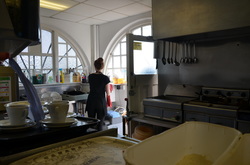
Successfully running a restaurant on the British seaside coast requires an outgoing and engaging personality that many Britons aren’t used to, according to Tony Smith, who runs a tea stall called Sara’s Tearoom in Great Yarmouth, UK.
I had the honor of speaking with Tony on Saturday afternoon – a day full of sunny weather and a larger crowd of tourists than usual on the Marine Parade, which is Yarmouth’s main road along the sea. His shop, a small building that was used in the early 1900s as a shelter to protect members of the upper class from the sun, was painted white with light wood floors and windows that allowed the sun to seep through and warm the seats.
In a passionate but critical tone, Tony explained to me that the British seaside resorts were seeing much less foot traffic from tourists in recent years. His business is one of many that has had to find new ways to attract customers. Back in the 60s and 70s, swaths of people would come to Yarmouth to enjoy a weekend getaway – meaning establishing a customer base was not difficult. However now, a day and age when cheap air travel is prevalent, Tony has had to change his business model from one of appealing to the masses to appealing to the regulars. He is more focused on quality versus quantity and bringing the best experience possible to his customers. Tony, like many local business owners, is proud of Yarmouth and its history and wants it to be a town that thrives. However, he worries about how a decline in tourism could affect the town’s quality of life. Yarmouth is very dependent on its tourism industry and must find a way to move forward and become the village that its people want it to be.
On Friday I had the chance to talk with one of the main economic drivers in town, Albert Jones, the owner of Pleasure Beach. Pleasure Beach is a local amusement park that has been in Yarmouth for over 100 years – most of that time owned by the Jones family. Albert Jones agrees with Tony that tourism culture in Yarmouth is changing – fewer people are making the trip to coastal resorts and those who are expect better quality than they used to. I discovered that Tony and Albert Jones actually have a partnership – Tony runs his tea stall on land owned by Albert Jones. Albert Jones was the one who encouraged Tony to start up the stall and name it after his wife, Sara.
After spending the past few days focusing my attention on local heritage, it was nice to get to talk to a few business owners whose livelihoods depend on whether or not the tourism sector is doing well. Most of my sources here agree without a doubt that local tourism is struggling to survive and business owners must find a way to adapt to a changing industry. While Yarmouth suffers from a very real decline in foot traffic, a lot of the negative stigma surrounding the town is just perception, according to Tony (Owner of Sara’s teastall). He argues that a negative image of Yarmouth as dirty and crime-ridden has spread along the east coast and is contributing to a decline foot traffic. Recent media coverage and academic reports released about the “dreary” state of British costal tourism has definitely added to this stigma.
Most people who are living and working in Yarmouth are proud of the town. They are proud of the fact that it was once home to people like Charles Dickens who declared it to be a marvelous place. Yarmouth was once the king of seaside resorts – a place where people of all ages and all backgrounds would come to escape. While this reality likely cannot be reached again, locals believe Yarmouth can survive and will survive as long as its people adapt.
[portfolio_slideshow id=89]
